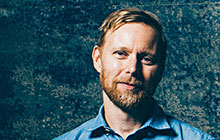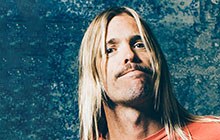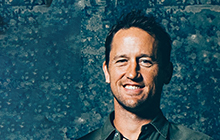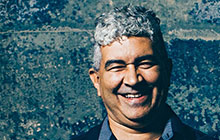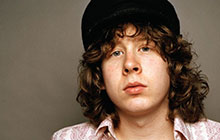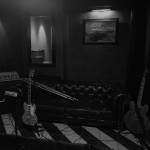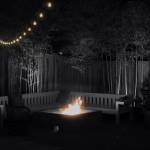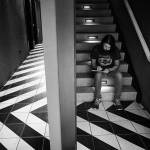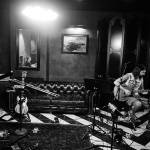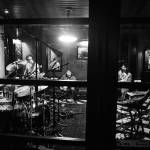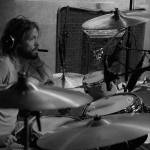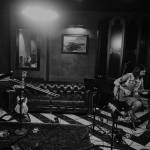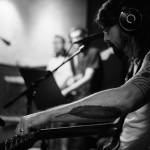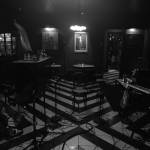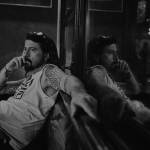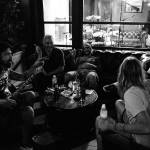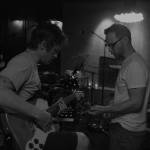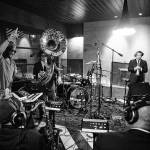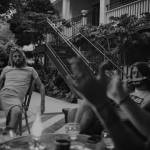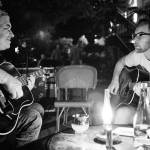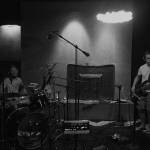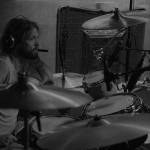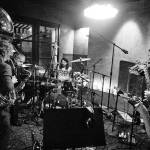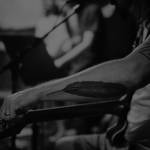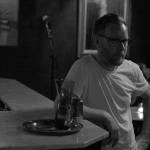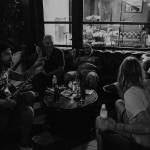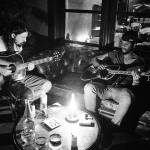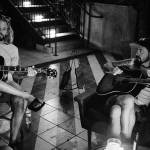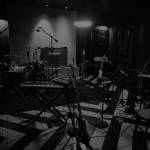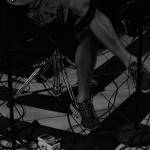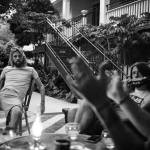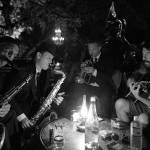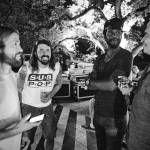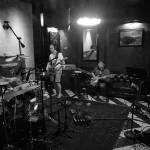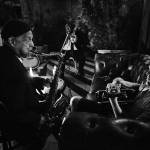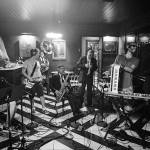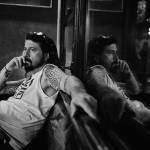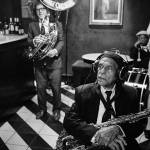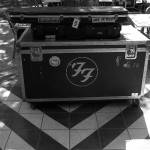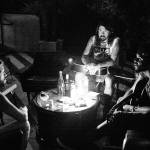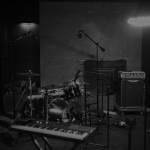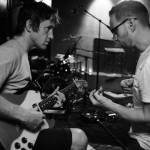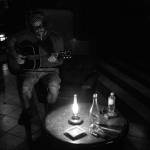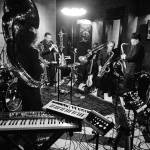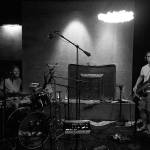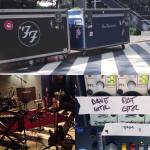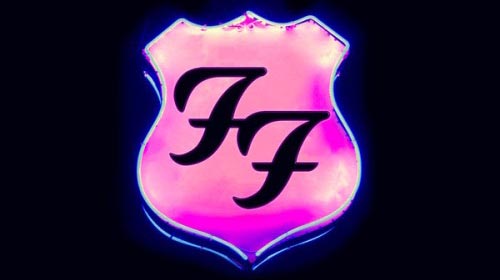Session Information
Following release of their eighth studio album in November 2014 the band planned to spend the next twelve months doing what they did best, touring the world playing shows to thousands of fans. In June 2015, whilst playing a show in Gothenburg, Sweden, Dave Grohl tripped and fell fifteen feet from the stage. The resulting impact with the ground caused multiple fractures to his right leg with Dave announcing to the shocked crowd “I think I just broke my leg”. The show went on that night, but the injury threatened the remaining six months of the tour with uncertainty on whether Dave could perform.
Half a dozen shows were indeed canceled whilst Grohl’s injury was evaluated and treated but on Independence Day, less than a month after the accident, Dave and the band returned to the stage for their scheduled event in Washington, D.C. Grohl had constructed a ‘throne’ that he could sit on throughout the shows and continued to use it for the rest of the tour.
By the end of September the tour was nearing its end with just a handful of shows in the United States during October followed by a final leg in Europe through November. Two of those performances in their homeland were set to take place at the Austin City Limits music festival, in Austin, Texas. The band was due to perform over two consecutive weekends with shows in Georgia and Tennessee sandwiched between.
Whilst in Austin the band had been booked into Hotel Saint Cecilia, a “lush retreat from the world” located in the heart of the city. Their transport arrived at the hotel in the early hours of September 30th, with two free days until their first performance across town.
It was upon their arrival at the hotel complex that Dave Grohl was struck by an impulsive idea – record a handful of songs as a thank you gift to fans for their support over the last eighteen months.
Just yards from the hotel was Arlyn Studios, a large, purpose-built recording studio that was even equipped with a one-of-a-kind Neve recording console like the one featured in the Sound City documentary. Recording some songs at the studio would have made perfect sense logistically but Dave Grohl is not one for conventional, easy solutions. In the previous few years, he’d recorded an album in his garage and another one touring the United States.
Enjoying a challenge, he instead considered the prospect of recording at the hotel itself. The owner of the hotel, Jenny Schipani, had heard what the band were considering and made the offer to let them use her facilities. Grohl was a little unsure initially, but it didn’t take long for his mind to be made up - “After rolling it around in my head a few times, it made perfect sense!” exclaimed Grohl. “Returning to the city where the entire Sonic Highways concept was born, loading in one last time to a room that was never designed to be a recording studio a la Sonic Highways, and making some music! Fate? Destiny? I was too tired to figure that kind of shit out, so I hit the sack, woke up the next morning and started making some calls,” he explained.
The band and crew got to work that next morning and the hotel was soon transformed into a makeshift recording studio. The office became a control room whilst the large bar and lounge area became the main recording space. “Amps were in the kitchen, Drums in front of the fireplace” recalled Grohl of the improvised setup.
Owing to the spontaneity of the session there was no time to ship any of their studio gear from Los Angeles to the hotel – that meant no analog tape recorders, no special outboard equipment. They instead had to make do with the equipment they traveled with whilst touring.
A Mac computer was set up running ProTools recording software and outboard gear consisted of just a few Neve EQs and compressors that they had with them. Microphones were set up around the lounge area and again, with no time to ship any of their preferred studio gear, the band would have to make do with their touring guitars, drums, and amplifiers.
By 6 pm on October 1st everything was in place and with acclaimed local producer Kevin Szymanski on hand to help with recording, the band picked up their instruments and started jamming. Rather than write brand new songs the band started exploring ideas from the Foo Fighters parts bin, revisiting older songs and ideas that they had previously worked on but then scrapped for whatever reason. “Riffs and ideas were thrown around, songs that were lost in the shuffle over the years, songs that were left unfinished,” said Grohl. “Like a musical retrospective, we were going through decades of songs no one has ever heard, pieces left on the cutting room floor from every album. Our own sonic scrapbook.”
The band worked without any pressures or expectations, playing around with whatever came to mind. To increase the fun factor the band decided to invite some friends to join them – local Gary Clarke Jr. arrived and reciprocating the hospitality shown to them 18 months earlier, Grohl invited the Preservation Hall Jazz Band along to what was essentially half party, half recording session.
With the relatively small lounge area full of bodies and instruments ideas and freeform jams were soon flowing. At one point, whilst the Jazz band was “doing their thing” Grohl jumped behind the drum kit and played through what an engineer at the session described as an “incredible moment that [I] won’t forget any time soon, such smooth jams”. The day soon turned into night, with Dave ensuring that the trusty laptop was capturing every moment. “As the hours passed, the atmosphere had reached exactly what every recording experience should be,” said Grohl of what he described as a celebration. Not wanting to lose any moment of magic everything was recorded, even if it was unlikely to be released publicly “because you just might miss something that you’ll never get back again. Moments that happen once in a lifetime.”
The first fully fleshed out track they got into would later be named after the hotel, which in turn was aptly named after the patron saint of musicians, Saint Cecilia. Whilst both of the evening’s guests would feature on initial recordings of the song, they were not included in the final mix of the track.
Recording continued over the weekend, the band getting as much done as they could before they needed to head out of the city to play shows. ‘Sean’ was a short, upbeat track and the third, ‘Fuck Around’, was the first of the older song ideas they worked on to retain an old title. The title had first been mentioned by Dave Grohl way back in 1998, whilst discussing ideas they were working on for their third studio album - “We have one new song called ‘Fuck Around’ – It’s kinda like the summer anthem” he told an interviewer. Whilst the band did work on the song when recording for that album got underway in 1999, it did not make the final cut.
Persisting, the band would try to record it on several further occasions. It was attempted as an acoustic track for 2005s ‘In Your Honor’ album and was seen on planning boards during pre-production for their 2011 album ‘Wasting Light’. It once again did not make the final cut, and so here once again they attempted the track. On this occasion, very little instrumentation was recorded for the song, Grohl playing a couple of simplistic acoustic guitar track accompanied by Rami Jaffee on piano.
The fourth track to be worked on was given the working title ‘Save Your Breath (Cuz it’s mine)’, later simplified with the wordplay ‘Savior Breath’. In comparison to the somber, acoustic ‘Fuck Around’ this was a heavy affair with a wall of heavy guitars in a frenetic, almost hardcore tempo.
A fifth and final track was then worked on - ‘7 Corners’. Like ‘Fuck Around’ it was a track that had been floating around for a long time, perhaps their most well-known unreleased track among die-hard fans, also giving this publication its title. The name for the song came from the Seven Corners area of Fairfax, Virginia, close to where Grohl had spent much of his youth. The area had got its name from an intersection of four highways – State Route 7, U.S. Route 50, State Route 613 and State Route 338. The coming together of these four roads at one time created an intersection with seven corners, although the later re-routing of one road means that is no longer the case today.
The track had first been recorded during sessions for their second album ‘The Colour And The Shape’ and fans first heard discussion of the title during recording for their third album, when the band once again attempted it. Since then Foo Fighters had pulled the song out at some point during recording for every subsequent album, but it always ended on the cutting room floor.
Explaining the reason why in 2005 Grohl described the track as “a great riff but it's not a great song - it could be though.”
After recording the track once more during pre-production for 2011s ‘Wasting Light’ the band leader suggested in an interview that if they didn’t use it for that album, they would finally put it to rest forever. Whilst it once again did not make the cut Grohl just couldn’t let the riff die and decided to give it another shot in Austin. Guitarist Chris Shiflett recorded five different solos for the newest version of the song and when playing them back all at once an engineer at the session described the resulting sound as “a beautiful hurricane of guitars”. For the final product, things were pared down slightly, Chris bringing the best parts of each into one cohesive solo.
The basic tracks were cut for all five songs over the weekend, with their first headline performance at Austin City Limits Festival squeezed in the middle. The band then downed tools and headed out on the road for shows in Georgia and Tennessee in the week. No vocals were recorded during the first weekend of recording, that process, as well as overdubs and any other final tweaks, were planned for their return the following weekend.
With their live commitments completed the band hurried back to the hotel and on October 8th got to work on finishing up the work they’d started the previous weekend.
A makeshift vocal booth was set up in the bathroom of one of Hotel Saint Cecilia’s poolside bungalows. “The coffee table became a pile of guitar pedals and scribbled lyrics, beer bottles and ashtrays” recalled Grohl. Whilst recording vocals for the first song, ‘Saint Cecilia’, Ben Kweller arrived at the hotel, a singer-songwriter and multi-instrumentalist from Texas. He and Grohl had met in the 90s but this was the first time they had been together in several years.
Grohl noted that even without prompting Ben seemed keen to join in. “We hugged, hit play to listen to the last vocal take, and he instinctively started singing the perfect harmony to my line”. Grohl quickly instructed Kweller to “get his ass in there and sing it right now!” Kweller picked up some hotel stationary with Grohl’s hastily scribbled lyrics written on it and “banged his part out in two glorious takes”.
Most of the lyrics were written by Grohl at the hotel and he spent the remaining day and a half committing them to the ProTools sessions, with Taylor Hawkins singing backing vocals for the tracks ‘Sean’ and ‘Fuck Around’. As well as the vocal tracks a few guitar overdubs were recorded on the second weekend and everything was finished up before it was time to head across the city for their second performance at the Austin City Limits festival. Grohl teased the crowd during that performance, telling them about the music they’d just finished recording - “You know what I did last night? We recorded five fucking new songs in your beautiful city.” The crowd may have expected them to debut some of the new songs but Grohl killed those hopes, telling them “We’re gonna give it to you! But not tonight.”As originally planned, it was intended to release the music after the last date of the tour on November 19th and soon after the session the band placed a countdown timer on their website, counting down to November 23rd, the selected day for release.
A few weeks before that date Dave Grohl penned a letter in a Berlin hotel room, shortly before the band played a show on the final European leg of their tour. The letter was written to the fans of the band, explaining how the EP had come about and that it was a gift to them, the fans.
On November 13th, ten days before the planned release, a tragedy occurred in Paris, France. A number of terrorist attacks occurred across the city, the worst being an attack on the Bataclan Theatre where friends of the band Eagles Of Death Metal were performing. 130 people were killed in the various attacks including ninety in the Bataclan, with hundreds more injured. On hearing the news Foo Fighters offered words of sympathy for the victims and announced they were cancelling the remaining dates of their tour, one of which was scheduled in Paris. The band headed home in a subdued mood, the devastating attacks prematurely ending a tour which had seen many ups and downs.
On November 19th Grohl penned an addendum to his previous letter, discussing the attacks and explaining that their project for the fans had taken on a new meaning, hoping that the music they were about to release could help in any small way. “Now, there is a new, hopeful intention that, even in the smallest way, perhaps these songs can bring a little light into this sometimes-dark world. To remind us that music is life, and that hope and healing go hand in hand with song. That much can never be taken away.”
‘Saint Cecilia’, ‘Sean’, ‘Savior Breath’ and ‘7 Corners’ were all included on the EP, the latter given the new title of ‘The Neverending Sigh’, a nod to the long history of the track. The songs were mixed by James Brown back at Studio 606 and then mastered by Emily Lazar at The Lodge in New York. It was made available as a free download on November 23rd as planned but ‘Fuck Around’ was not included, the band once again deciding it was still not ready for the public.

